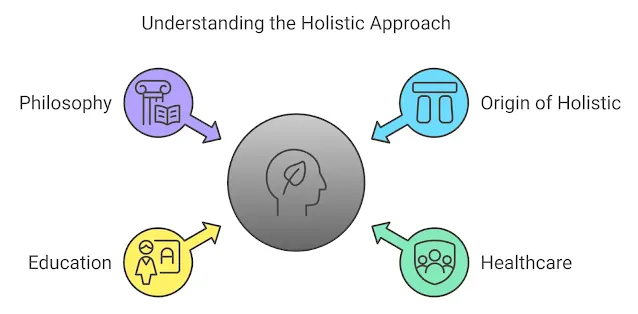Holistic Health: A Comprehensive Guide
In today's fast-paced world, many people are seeking alternative approaches to healthcare that focus on the whole person rather than just treating individual symptoms. Holistic health is a philosophy that emphasizes the interconnectedness of the mind, body, and spirit. It aims to promote overall well-being and prevent illness by addressing the root causes of health problems.
What is Holistic Health?
Holistic health is a comprehensive approach to healthcare that recognizes the interconnectedness of all aspects of a person's life. It goes beyond traditional medicine to address the physical, emotional, mental, and spiritual dimensions of well-being. Holistic practitioners believe that these aspects are interrelated and influence each other.
Key Principles of Holistic Health
Holistic health is based on several key principles:
- Individualized Approach: Holistic practitioners believe that each person is unique and has individual needs. They tailor their treatments to the specific needs of each patient.
- Prevention: Holistic health emphasizes prevention rather than cure. By addressing the root causes of health problems, holistic practitioners aim to prevent illness and promote overall well-being.
- Mind-Body Connection: Holistic health recognizes the strong connection between the mind and body. It emphasizes the importance of emotional and mental health in physical well-being.
- Natural Healing: Holistic practitioners often use natural remedies and therapies to promote healing, such as herbs, acupuncture, and meditation.
- Holistic Lifestyle: Holistic health encourages a healthy lifestyle, including a balanced diet, regular exercise, and adequate sleep.
Different Approaches to Holistic Healing
There are many different approaches to holistic healing, each with its own unique philosophy and techniques. Some of the most popular approaches include:
- Ayurveda: This ancient Indian system of medicine emphasizes balance and harmony in the body. It uses herbs, diet, and lifestyle changes to promote health.
- Traditional Chinese Medicine (TCM): TCM is a system of medicine that originated in China thousands of years ago. It includes acupuncture, herbal medicine, and Qigong.
- Naturopathy: Naturopathy is a system of medicine that emphasizes the body's natural healing ability. It uses natural remedies and lifestyle changes to promote health.
- Homeopathy: Homeopathy is a system of medicine that uses highly diluted substances to stimulate the body's natural healing processes.
- Mind-Body Therapies: These therapies focus on the connection between the mind and body. They include meditation, yoga, and hypnotherapy.
Benefits of Holistic Health
Holistic health can offer many benefits, including:
- Improved physical health: Holistic approaches can help to prevent illness and improve overall physical health.
- Reduced stress and anxiety: Holistic practices can help to reduce stress and anxiety, promoting emotional well-being.
- Increased energy and vitality: Holistic therapies can help to increase energy levels and improve overall vitality.
- Improved mental clarity and focus: Holistic practices can help to improve mental clarity and focus.
- Enhanced spiritual well-being: Holistic approaches can help to promote a sense of spiritual connection and fulfillment.
Incorporating Holistic Health into Your Life
There are many ways to incorporate holistic health into your life. Here are some tips:
- Find a holistic practitioner: If you're interested in trying holistic therapies, find a qualified practitioner who is experienced in the approach you're interested in.
- Make lifestyle changes: Incorporate healthy lifestyle habits into your daily routine, such as eating a balanced diet, exercising regularly, and getting enough sleep.
- Practice mindfulness: Mindfulness techniques, such as meditation and deep breathing, can help to reduce stress and improve
overall well-being. - Connect with nature: Spending time in nature can have a positive impact on your physical and mental health.
- Explore different approaches: Don't be afraid to experiment with different holistic approaches to find what works best for you.
Conclusion
Holistic health offers a comprehensive approach to healthcare that emphasizes the interconnectedness of the mind, body, and spirit. By incorporating holistic practices into your life, you can improve your overall well-being and achieve a greater sense of balance and harmony.
Q&A:
- What is holistic health?
- Holistic health is a comprehensive approach to healthcare that emphasizes the interconnectedness of the mind, body, and spirit.
- What are the key principles of holistic health?
- The key principles of holistic health include individualized approach, prevention, mind-body connection, natural healing, and holistic lifestyle.
- What are some different approaches to holistic healing?
- Some popular approaches to holistic healing include Ayurveda, Traditional Chinese Medicine, naturopathy, homeopathy, and mind-body therapies.
- What are the benefits of holistic health?
- Holistic health can offer many benefits, including improved physical health, reduced stress, increased energy, improved mental clarity, and enhanced spiritual well-being.
- How can I incorporate holistic health into my life?
- You can incorporate holistic health into your life by finding a holistic practitioner, making lifestyle changes, practicing mindfulness, connecting with nature, and exploring different approaches.

